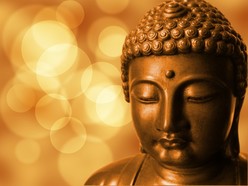
The full moon of May is the time for Vesak, a Buddhist holiday that, in the Theravadan tradition, celebrates the birth, enlightenment, and death of Siddhartha Gotama (who became the Buddha). It is also a time to reflect on what kinds of support exist in your life for spiritual practice and your overall health and development. Taking refuge in the Triple Gem -- Buddha, Dhamma, and Sangha -- is encouraged.
But I see another approach to contemplating refuge. Buddhist teachings emphasize training the mind to see change: The impermanence and hence unreliability of experiences. Sometimes this is thrust upon us through life, and other times we encounter it through meditation.
As we open deeply to impermanence, there may come a point where finding a reliable refuge comes to the fore. Suddenly the common term "going for refuge" takes on new meaning. We are to seek refuge in Buddha, Dhamma, and Sangha, but what does this mean?
It's worth noting that the original Pali texts contain few details on what refuge really means. One thing we can notice about it is that it tends to be voluntary; the Buddha does not solicit it, nor does he express approval when a follower spontaneously declares it. Only in the later commentaries is it defined more clearly.
This gives us some free reign to consider personally what refuge in Buddha, Dhamma, and Sangha means to us. If this sounds like something extra to take on, consider:
We are always taking refuge in something – perhaps our job, relationships, body/health, status, etc. So it's not so much a matter of taking on something new, but looking at the quality of the refuge(s) we already have. We're not starting from zero. The first question to ask is, how reliable is your refuge?
For myself, I started with some pretty unreliable refuges. As a 30-year-old, I was devoted to my career and also enjoyed my healthy body through being an athlete. None of this was particularly unskillful, but it certainly wasn't reliable.
Fortunately, I received a great gift. Through longterm illness, my body was shown to be out of my control, which initially caused confusion and despair – as well as opened my heart to faith and wisdom. The three refuges offered on the path (also called the Triple Gem) are more reliable than the usual things we choose. We can feel this intuitively, especially when the world of experience is bringing pain.
A few years later, I had a chance to participate in a formal Refuge Ceremony at a lay Dharma center. I knew I wanted to do it, but could not say quite why. I was amazed at how meaningful the experience was, filling my body with light energy and a deep sense of satisfaction. I knew I was "home" and was doing something really important – more important than I could really comprehend.
Over the years, I continue to contemplate the Triple Gem. At this time, I could say of each one:
Buddha: Trusting awareness over story. Opening to mystery.
Dharma: Trusting the process.
Sangha: Those who help illuminate or nurture my sense of trust, sometimes by their mere presence.
The subtitle of Sharon Salzberg's book Faith is, "Trusting your own deepest experience." This is the Art of Refuge: Trusting my own deepest understanding, even when there is no confirmation, approval, or even comprehension of it from others. Sometimes it even goes beyond my own comprehension.
Walking the Path feels to me like learning to live from this place, and this takes practice. How can we stay in touch with that freedom and still live in the world?
Here is a talk I gave on the Refuges in 2015.
But I see another approach to contemplating refuge. Buddhist teachings emphasize training the mind to see change: The impermanence and hence unreliability of experiences. Sometimes this is thrust upon us through life, and other times we encounter it through meditation.
As we open deeply to impermanence, there may come a point where finding a reliable refuge comes to the fore. Suddenly the common term "going for refuge" takes on new meaning. We are to seek refuge in Buddha, Dhamma, and Sangha, but what does this mean?
It's worth noting that the original Pali texts contain few details on what refuge really means. One thing we can notice about it is that it tends to be voluntary; the Buddha does not solicit it, nor does he express approval when a follower spontaneously declares it. Only in the later commentaries is it defined more clearly.
This gives us some free reign to consider personally what refuge in Buddha, Dhamma, and Sangha means to us. If this sounds like something extra to take on, consider:
We are always taking refuge in something – perhaps our job, relationships, body/health, status, etc. So it's not so much a matter of taking on something new, but looking at the quality of the refuge(s) we already have. We're not starting from zero. The first question to ask is, how reliable is your refuge?
For myself, I started with some pretty unreliable refuges. As a 30-year-old, I was devoted to my career and also enjoyed my healthy body through being an athlete. None of this was particularly unskillful, but it certainly wasn't reliable.
Fortunately, I received a great gift. Through longterm illness, my body was shown to be out of my control, which initially caused confusion and despair – as well as opened my heart to faith and wisdom. The three refuges offered on the path (also called the Triple Gem) are more reliable than the usual things we choose. We can feel this intuitively, especially when the world of experience is bringing pain.
A few years later, I had a chance to participate in a formal Refuge Ceremony at a lay Dharma center. I knew I wanted to do it, but could not say quite why. I was amazed at how meaningful the experience was, filling my body with light energy and a deep sense of satisfaction. I knew I was "home" and was doing something really important – more important than I could really comprehend.
Over the years, I continue to contemplate the Triple Gem. At this time, I could say of each one:
Buddha: Trusting awareness over story. Opening to mystery.
Dharma: Trusting the process.
Sangha: Those who help illuminate or nurture my sense of trust, sometimes by their mere presence.
The subtitle of Sharon Salzberg's book Faith is, "Trusting your own deepest experience." This is the Art of Refuge: Trusting my own deepest understanding, even when there is no confirmation, approval, or even comprehension of it from others. Sometimes it even goes beyond my own comprehension.
Walking the Path feels to me like learning to live from this place, and this takes practice. How can we stay in touch with that freedom and still live in the world?
Here is a talk I gave on the Refuges in 2015.


 RSS Feed
RSS Feed